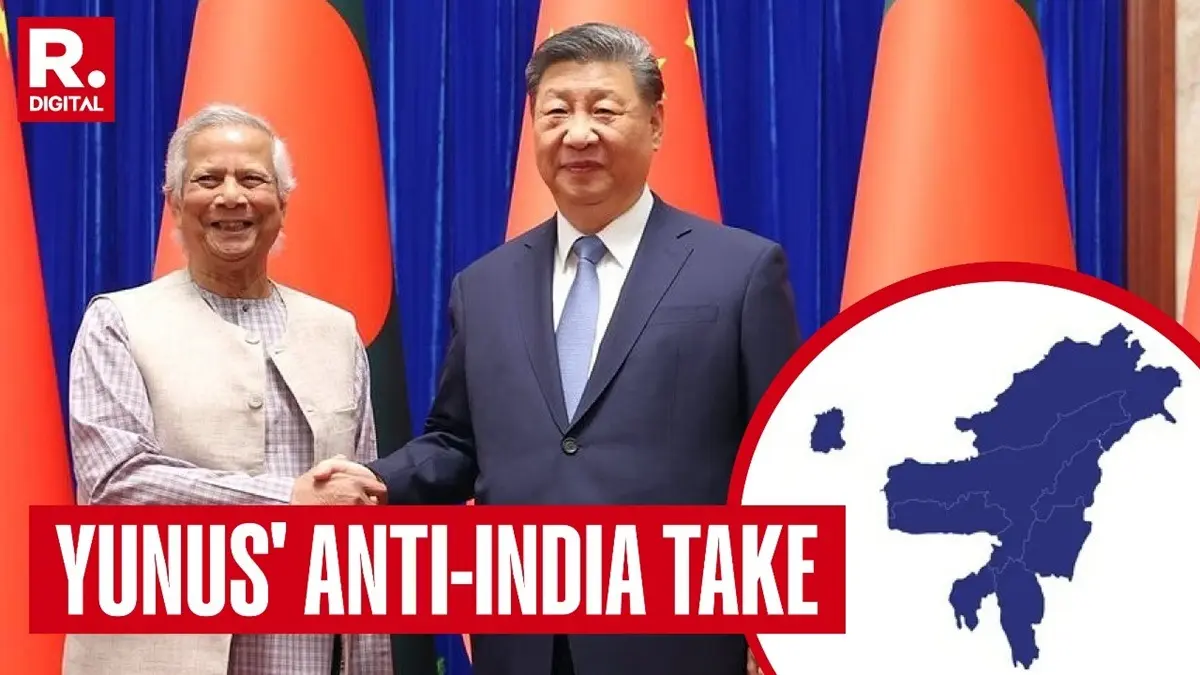Updated 31 March 2025 at 15:37 IST
'Bangladesh Only Guardian Of The Ocean': Yunus' Anti-India Rant in China Triggers Massive Backlash
Bangladesh's Muhammad Yunus asks China to use Bangladesh against India’s Northeast, falsely claiming it as the region’s "only guardian of the ocean."
- India News
- 4 min read

New Delhi: Bangladesh ’s interim government head, Muhammad Yunus, has ignited a storm of controversy with his brazen anti-India rhetoric, making a wildly misleading claim that Bangladesh is the "only guardian of the ocean" for India's northeastern states, known as the Seven Sisters. His reckless statement is a direct attack on India's sovereignty, falsely portraying these landlocked states as helplessly dependent on Bangladesh for maritime access. By peddling such narrative, Yunus blatantly ignores India's extensive infrastructure developments and strategic initiatives to enhance connectivity.
'Bangladesh: Only Guardian Of The Ocean?'
"Seven states of India, the eastern part called the Seven Sisters, they are a landlocked country, landlocked region of India. They have no way to reach out to the ocean. We are the only guardians of the ocean for all this region (North East India). This opens up a huge possibility," Yunus stated, making an unsubstantiated and misleading assertion about India’s connectivity.
His statement ignores the fact that India has been heavily investing in its Act East Policy, boosting connectivity through projects like the Kaladan Multi-Modal Transit Transport Project and road networks linking the region to Myanmar and Southeast Asia. His remarks attempt to downplay India’s strategic autonomy and falsely position Bangladesh as an irreplaceable transit point.
A Shocking Call for Chinese Expansion in India's Backyard
In an even more alarming remark, Yunus openly suggested that Northeast India should serve as an "extension of the Chinese economy," stating, "So this could be an extension of the Chinese economy—build things, produce things, market things, bring things to China, bring it to the rest of the world. That’s a production house, that is the opportunity we should seize and implement and get it done."
Advertisement
This direct endorsement of Chinese economic expansion into Indian territory raises serious security concerns. At a time when India is actively countering China’s aggression along the Line of Actual Control (LAC) and strengthening regional partnerships, Yunus’s comments appear to align with Beijing’s interests rather than fostering genuine regional cooperation.
Exploiting Regional Resources for Bangladesh's Gain?
Further, Yunus suggested that Nepal and Bhutan’s vast hydropower resources should be exploited for Bangladesh’s industrial growth. "Nepal has unlimited hydropower, which is a blessing. Bhutan has unlimited hydropower, which is a blessing. We can bring it to our purpose, set up our factories, and so on. From Bangladesh, you can go anywhere you want because the ocean is our backyard", the Bangladeshi leader said.
Advertisement
What Exactly Is The Significance of 7 Indian States Being Landlocked? Asked Sanjeev Sanyal
Sanjeev Sanyal, economist and member of the Economic Advisory Council to the Prime Minister, reacted sharply to Yunus' statement, questioning its relevance. He pointed out that while China is free to invest in Bangladesh, Yunus’ appeal to the Chinese by citing the landlocked nature of seven Indian states seemed puzzling. Sanyal stressed on the lack of connection between the two matters, raising concerns over the intent behind the statement. “Interesting that Yunus is making a public appeal to the Chinese on the basis that 7 states in India are land-locked. China is welcome to invest in Bangladesh, but what exactly is the significance of 7 Indian states being landlocked?” asked Sanyal.
Yunus' China Pivot
Earlier, Yunus openly pushed for Bangladesh to embrace China as a key ally, doubling down on his pro-Beijing stance. Wrapping up his visit, he declared hopes for a "new phase" in China-Bangladesh relations, signaling an alarming shift in Dhaka’s geopolitical alignment.
During his meeting with Chinese President Xi Jinping, Yunus eagerly sought greater Chinese investments to prop up Bangladesh’s faltering economy. Going even further, he pleaded for a 50-year master plan from Beijing for river and flood management—effectively handing China a say in Bangladesh’s critical infrastructure and deepening its dependence on the communist regime.
Get Current Updates on India News, Entertainment News, Cricket News along with Latest News and Web Stories from India and around the world.
Published By : Surabhi Shaurya
Published On: 31 March 2025 at 15:25 IST
